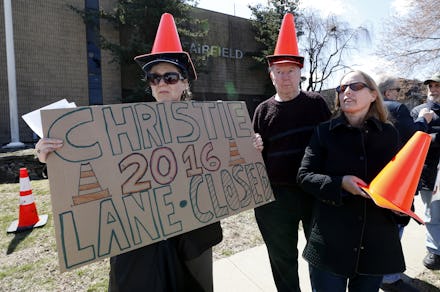Chris Christie: A Guide to the New Jersey Governor's Bridge Scandal

While few commuters would ever call themselves fans of the Port Authority of New York and New Jersey, it's difficult to imagine any delays at the terminal competing with the traffic jam in Fort Lee, New Jersey, in 2013, particularly when it was later revealed to be caused voluntarily. As a result, GOP hopeful and New Jersey Gov. Chris Christie's 2016 presidential campaign was tarnished before he even announced his candidacy, as the governor's office was at the forefront of the major scandal. How did it all start?
Retaliation against Fort Lee mayor: The traffic jam occurred in September 2013 and began on the first day that the state's public schools opened. On the same day, two of the three lanes between the George Washington Bridge and Fort Lee were closed, which caused major traffic delays for residents and lasted four days total, according to the Washington Post. "The closures ... created a traffic bottleneck in Fort Lee that has been described as the worst traffic jam since Sept. 11, 2001," Aaron Blake wrote for the Post.
In the aftermath, an appointee of New York Gov. Andrew Cuomo ordered the re-opening of the lanes, as it was endangering lives in the area as emergency responders had been caught in the traffic before it was eventually cleared. It was, however, an incident Fort Lee residents called "worse than a disaster." "It was utter chaos those days," Fort Lee business owner Debbie Minuto said in an interview with CNN. "The bridge is a lifeline here. You take away the bridge, you take away our livelihood."
It was later revealed that the closure was ordered by David Wildstein — a former Port Authority official and high school friend of Christie's — after he received an email from Christie's former deputy chief of staff, Bridget Anne Kelly, which read, "Time for some traffic problems in Fort Lee," according to the Washington Post. Many believe the reason for creating the traffic problems was in retaliation to Fort Lee's Democratic mayor, Mark Sokolich, as he did not endorse Christie's re-election campaign, according to CNN.
"Chris Christie owes the people of New Jersey straight answers about his role in this alleged abuse of power for political retribution," Adrienne Elrod — communications director at Correct the Record, an extension of a pro-Democratic group specializing in opposition research — said, according to CNN.
Christie's response: When the incident caught the mainstream media's attention, Christie denied involvement in the scandal at a press conference in December 2013, according to the Star-Ledger. Instead of admitting blame, he began to poke fun at the scandal. "I worked the cones," Christie said at the conference, according to the Star-Ledger. "Unbeknownst to anyone, I was working the cones."
However, after Kelly's email surfaced, he changed his tune and promptly fired his deputy chief of staff, emphasizing that he is "not a bully," according to CNN. "Christie's tone and message represented a valiant attempt to disconnect himself from the embarrassing events that have attracted the attention of federal prosecutors, simultaneously pleading ignorance and accepting responsibility," Leigh Ann Caldwell wrote for CNN.
Watch an excerpt from the apologetic press conference below:
Two indicted: In the legal aftermath, two officials were charged with involvement in the scandal: Kelly and Bill Baroni, former deputy executive director of the Port Authority, while Wildstein pleaded guilty separately, according to the New York Times. However, Kelly added that the implication that she was the only staff member in the governor's office aware of the decision was "ludicrous," according to the Times.
The suggestion there is that many more dominoes could have fallen. To that point, a lawyer of Wildstein's reiterated that his client believes "evidence exists" that Christie knew about the lane closings, though the governor was never formally charged, according to the Wall Street Journal. "If Mr. Wildstein has evidence suggesting Mr. Christie knew more than he claims, it could undermine the governor's previous denials of involvement in the scheme or its cover story," Josh Dawsey and Heather Haddon wrote for the Journal.
Twitter, as always, was more blunt on the matter:
Poll numbers drop: Though Christie was not charged in the scandal, it was a crushing blow for his local approval ratings. According to a Quinnipiac University poll released in April 2014, 51% of New Jersey residents who knew about the scandal believed Christie knew "what his aides were doing," though the majority said they did not think he personally ordered it. However, his approval rating was nearly at an all-time low for the time: Only 49% approved of his job as governor.
"Voters don't think he'd be a good president and they don't want him to run," Maurice Carroll, assistant director of the Quinnipiac University Poll, said in an accompanying statement. "They're uncertain about his honesty and a lot still think he's a bully — but they give him high marks on leadership."
Big picture-wise, it has affected the start of his 2016 presidential campaign — particularly the sarcastic and callous responses to the scandal at the offset — before his office was known to be formally involved. "The idea that Christie might have inflicted pain on an entire town to settle a political score with its mayor also plays into an unflattering image of Christie as a bully — a reputation underscored by videos that show the governor berating teachers, journalists and town hall participants," Errol Louis wrote for CNN.
Thus far, it doesn't look promising for the governor. In the latest national poll by Monmouth University, released on Wednesday, Christie has just 3% support, which trails five Republican candidates and puts him in a three-way tie for sixth. Though it's certainly not the only reason his numbers are low — Trump's surge in the polls has proved problematic for several, more experienced candidates — any momentum in the polls with the upcoming primaries could be hindered by any mention of the scandal.